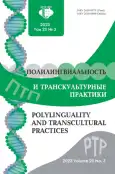Transformation of National Archetypes in the New Socio-Cultural Code of the Epoch in the Novels by M. Sholokhov and I. Babel of the 1920s
- 作者: Podobriy A.V.1, Sviridova A.V.1
-
隶属关系:
- South Ural State Humanitarian Pedagogical University
- 期: 卷 20, 编号 3 (2023)
- 页面: 535-547
- 栏目: Literary Dimension
- URL: https://journal-vniispk.ru/2618-897X/article/view/326688
- DOI: https://doi.org/10.22363/2618-897X-2023-20-3-535-547
- EDN: https://elibrary.ru/TFZKIN
- ID: 326688
如何引用文章
全文:
详细
The problem of interaction of different cultures in the modern world is very acute. It is connected not only with the multicultural space of Russia. Any country in the world is forced to solve a difficult task: how to ensure the most prosperous and fruitful coexistence and cooperation of representatives of different nationalities within the borders of the state and the national language. Culture and literature solve a similar problem. Interest in the “multicultural field” of Russian literature began to be actively formed in the XIX century, but it reached its maximum point of development in the 1920s at the “breaking of epochs”, at the time of the formation of a new socio-cultural code of the era. In the literature of the post-revolutionary years, there was active work not only on the formation of a new worldview, but also on the creation of a new social and international culture, using the most understandable and meaningful markers of this culture for the readership, i.e. a new code of the era, significantly different from its predecessor. In the article we will consider how dramatically one of the key archetypes of national consciousness (the image of a mother woman) has changed under the influence of new social relations and how this phenomenon has been reflected in the prose of Sholokhov and Babel.
作者简介
Anna Podobriy
South Ural State Humanitarian Pedagogical University
编辑信件的主要联系方式.
Email: podobrij@yandex.ru
ORCID iD: 0000-0001-6241-3917
Doctor of Philology, Associate Professor, Professor of the Department of Russian Language, Literature and Methods of Teaching Russian Language and Literature
Lenin Ave., Chelyabinsk, 69455080, Russian FederationAnna Sviridova
South Ural State Humanitarian Pedagogical University
Email: sviridovaav2@cspu.ru
ORCID iD: 0000-0002-9421-5170
Doctor of Philology, Associate Professor, Professor of the Department of Russian Language, Literature and Methods of Teaching Russian Language and Literature
Lenin Ave., Chelyabinsk, 69455080, Russian Federation参考
- Petrov, M.K. 1991. Language, sign, culture. Moscow: Nauka publ. Print. (In Russ.).
- Sidorova, T.A. 2019. Sociocultural code as a factor in the interpretation of derivatives from proper names in political discourse. In National codes in language and literature. Modern languages in new conditions of communication. Collection of articles based on the materials of the International Scientific Conference “National codes in language and literature”. Pp. 167–175. Print. (In Russ.).
- Astafieva, I.E. 2019. “Socio-cultural code” as a scientific category: methodological potential of use. Bulletin of the Faculty of Humanities of the St. Petersburg State University of Telecommunications 11: 118–125. Print. (In Russ.).
- Zotova, A.S. 2023. Polycode text as a tool for the formation of a socio-cultural field in brand communications. In Slovo. Text. Source: Methodology of Contemporary Humanitarian Research. Proceedings of the II International Scientific Conference. Moscow, 2023. N. Novgorod, pp. 292–299. Print. (In Russ.).
- Marinina, E.V. 2023. Sociocultural codes in Julian Fellowes’s novel “Shadows of the Past”. In Language. Culture. Translation. Communication. Collection of scientific papers. Moscow, 2023. Pp. 201–206. Print. (In Russ.).
- Renzenko, A.Yu. 2023. Textological paradigm of socio-cultural codes, reality and being: theoretical and cultural approach. Kazan science 4: 40–42. Print. (In Russ.).
- Leiderman, N.L. 2005. “Russian-language literature” is a crossroads. In Russian literature of the XX–XXI centuries: directions and trends. Yekaterinburg: Ural State University publ. Print. (In Russ.).
- Esaulov, I. 1993. Ethical and aesthetic in the poetics of I.E. Babel (“Pan Apolek”). Moscow: RGGU publ. Print. (In Russ.).
补充文件









